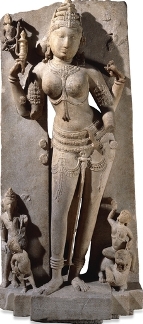
Many legends of rAjan bhojadeva pramAra allude to widespread erudition of the common man of his reign; many tales portray carpenters, potters, ironsmiths, tailors, field-labourers and even thieves having stunning knowledge of saMskR^ita and poetic talent.
Once, goes one such legend, a criminal condemned with capital punishment by the nyAyAdhyakSha was brought before bhoja for final hearing. Having heard the case bhoja asked the convict whether he had any plea before he delivered his verdict. The criminal, as is anticipated in the bhoja legends, responded with:
भट्टिर्नष्टो भारविश्चापि नष्टो भिक्षुर्नष्टो भीमसेनश्च नष्टः
भुक्कुण्डोहम् भुपतिस्त्वम् च राजन भानां पंक्तावंतकः सम्प्रविष्टः
bhaTTi has died, so has bhAravi; bhikShu is dead, so also bhImasena;
(Now watch out) O rAjan, yamarAja seems bent on consuming away the “bha-” vya~njana sequence (by the svara order a-A-i-I-u-U- etc), and with bhukkuNDa, that is me, about to be executed, you, bhUpati bhojadeva, might be the next one on his list!
Poetic audacity ensured clemency to the saMskR^ita-speaking convict.
Once his tailor taking measurements for making a waistcoat, uttererd this prAkR^ita pada: “bho.a.ehu gali kaNThula.u bhaNa keha.u paDihA.i / ura lachcHihi muha sarasati sIma nibaddhi kA.i” [O bhojadeva, (shall I) say how I see your neck? As if a boundary drawn between the realms of lakShamI residing in your heart and of sarasvatI in your mouth!]
prabandha chintAmaNi mentions that once traveling bhoja passed by an inn in his kingdom, and desirous of knowing how it was kept by the innkeepers, he went inside. It was managed by a lady named sItA and her daughter vijayA. The senior innkeeper impressed bhoja with her erudite poetry and was welcomed to join his retinue of the learned poets, and vijayA who was as splendid at poetry as striking she was in her looks, eventually won bhoja’s heart and became her favourite. One conversation is given: bhoja uttered, “suratAya namastasmai jagadAnanda-dAyine” [Bow to lovemaking, giver of pleasure to the worlds] to which she replied, “AnuSha~Ngika-phalaM yasya bhojarAja bhavAdR^ishAH” [which brings the births of the likes of bhojadeva.] This is similar to the conversation of samasyA-pUrti between bhoja and another young poetess in appreaciation of whose looks bhoja remarked, “asAre khalu saMsAre sAram sAra~NgalochanA” [Of this baseless world the only essence is those with the bow-like-eyes (women like you)], to which pat came the reply, “yasyAM kukShau samutpanno bhojarAja bhavAdR^ishaH” [whose wombs give birth to the likes of bhojarAja]
Once, says PC, bhoja taught his parrot to repeat ‘eko na bhavyaH’ [Only this one is not good], and asked his favourite vararuchi (the author of metrical vikramacharita and others) to go compose a convincing reply before the end of the day, on completion of which a great reward awaited. As the fate would have it he just could not find the right words and he was sitting by uttering these words near a field where the cows of an elderly shepherd were grazing. The shepherd approached him and asked what the matter was. vararuchi told him. Now the old man said that he could provide the best answer to this and let vararuchi have the reward, only if varachuti took him to the king, and carry his pet dog on his shoulders as the shepherd was too old to carry it himself. vararuchi did as told, and before bhojadeva the shepherd recited a pada that meant that, “Causing even a learned brAhmaNa to carry on his own shoulders the dog of a shepherd, the greed for money and fame is the one thing that is no good!”
In another legend, bhoja was once riding his horse when he saw an elderly timber-seller carrying an apparently heavy burden on his shoulders, so he asked him, in “broken” saMskR^ita, whether the burden was not too heavy for the old man. To this, the man sadly replied with a hemstitch in immaculate saMskR^ita, “Not anymore O moon-like bhojadeva, now that I have an even heavier burden on my heart! That our beloved rAjan either himself speaks ashuddha bhAShA or likely thinks that we do.” After apologies from bhoja, the man was greatly rewarded.
The great mammaTa of kashmIra country said about bhoja: “Scattered at night from the strings during kAmakeli from the bedrooms of the learned / pearls from being swept in the morning by the careless housemaids used to reach the streets/ where in reflection of the redness of AlatA from the feet of the young girls playfully walking / used to delude the parrots who chewed on them thinking to be pomegranate seeds / such was dhArA, and such its king bhojadeva whose generosity and scholarship created such happy days.” (kAvyaprakAsha 10.505)

